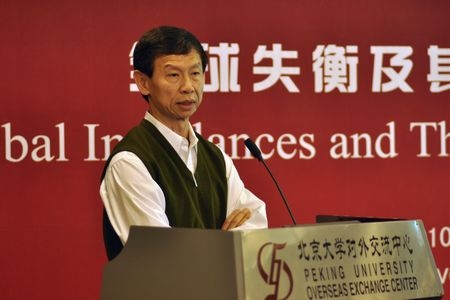Peking University, Nov. 12, 2010: The Economy Panel continued its discussion on “Global Imbalances and Its Solutions," centering on “Global and Regional Imbalances” on the morning of Nov. 6 at PKU Yingjie Overseas Exchange Center.
Prof. Chen Xiangming, founding Dean and Director of Trinity College’s new Center for Urban and Global Studies (CUGS), delivered a speech titled “Global Imbalance and Regional Rebalancing: Does the Spatial Shifts of China’s Export-Oriented Production Matter?" In his speech, Prof. Chen Xiangming briefly illustrates the salient aspects of the evolving regionally and locally clustered export manufacturing in China along both temporal and spatial dimensions, and points out the possible effect of China's domestic regional rebalancing of export-oriented manufacturing. After the discussion, Prof. Chen readily accepted our invitation for an interview.

Prof. Chen Xiangming delivering his speech in the panel session
Q: You mentioned in your speech that the domestic regional rebalancing of China’s export-oriented manufacturing machine had certain effect on global economic imbalance. Could you please elaborate a little bit on this viewpoint?
A: I think we cannot detect clearly this effect right now. Even if there is such effect, it is more or less indirect because the effect depends much on the relations between the rebalancing of China’s export-oriented manufacturing and other factors. But it is possible for us to see either of the two trends. The export is likely to increase along with increase in the value of exported products; and it may also decrease as a result of growth in the domestic demand brought by the development of more regions and the industries especially the high-technology industry. For example, advancement in chip technology gives force to the development in electric appliances which may enlarge domestic demand. This in turns leads to a decrease in export. Besides, the leave of low-cost manufacturing for countries like Vietnam and Indonesia whose labor value is much lower than that in China may also contribute to a decrease in China’s export.
Q: What effects do you think will the spatial shifts of China’s exported-oriented manufacturing bring to second and third tier cities?
A: Second and third tier cities will in general benefit a lot from the spatial shifts as they bring in more investment. But there’s still a distinction in terms of benefits between different cities. Cities, for example, second tier cities like Suzhou and Dongguan, or even third tier cities like Wujiang, will absorb more investment and produce more products since they are much closer to big cities in distance. Provided that these cities have a much lower labor cost, they will certainly benefit greatly from the spatial shifts, for instance, a higher employment rate, the upgrading of industries or even a direct participation in global economic cooperation. However some inland second and third tier cities may not get so much from the spatial shifts due to a long distance to big cities.
Q: Looking back a little, how do you see the effect of the global economic crisis in 2008 on the spatial shifts of China’s exported-oriented production? Or in what way has this regional rebalancing changed since the global economic crisis of 2008?
A: The influence is undoubtedly very obvious. As was widely reported in news, near 20 million lost their jobs. And this crisis has speeded up the pace for low-cost manufacturing to leave China for other countries. Of course the number of low-cost factories is not very big, particularly that of low-cost factories leaving for Vietnam because Vietnam has its own limitations in limited resources, poor infrastructures like transportation. Therefore, no big changes will take place, I think, in China’s manufacturing in 10 or 15 years. There is gradual domestic regional rebalancing in China, but the totals of China’s export will still hold its place in global economy.
Background:
A native of Beijing, China, Chen graduated from Beijing Foreign Studies University and received his Ph.D. in Sociology from Duke University. From 1989 to 2007, he served as Assistant to Full Professor of Sociology with adjunct appointments in Political Science and Urban Planning and Policy at the University of Illinois at Chicago where he also directed the International Studies, Asian Studies, and Sociology graduate programs. He also holds the positions of Distinguished Professor at Fudan University in Shanghai and honorary research fellows at the Institute of Economics of Shanghai Academy of Social Sciences and the IC2 Institute at the University of Texas at Austin. Chen is currently serving on the editorial board of the journal City & Community . He was elected to and served as President of the North American Chinese Sociologists Association during 1998-2000 and on the Council for the Community and Urban Sociology Section of the American Sociological Association during 2002-2005. ( Source: Trinity College Hartford Connecticut )
Extended Reading:
Reported by: Zhang Chunlan and Li Zhuoqun
Transcribed by: Zhang Chunlan